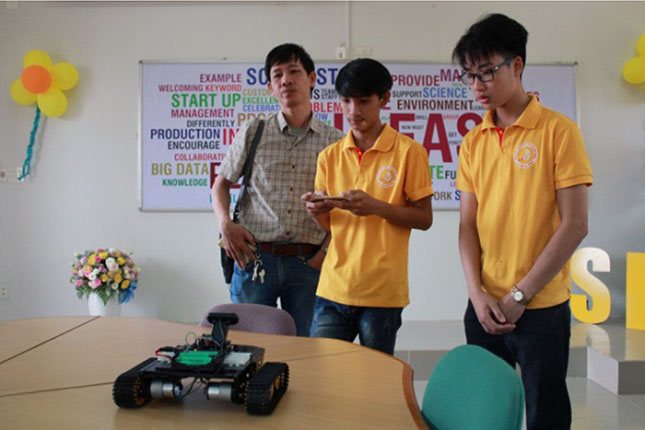Motivating students to conduct scientific research
The annual Da Nang Scientific and Technological Creation Competition has attracted a large number of university and junior college students who show their keen interest in conducting their scientific research activities, thereby turning their theory they learn in their schools into prototypes for technological solutions to real-world problems.
 |
| Scientific research activities amongst local students help to promote startup movements across the city. |
Co-organised by the Department of Science and Technology, and the municipal Youth Union, the competition aims to become a ‘cradle’ nurturing creative ideas and developing scientific research-inspired startup projects.
The event attracted 43 entries by over 150 university and junior college students in total across the city.
Most notably, many entries received high appreciation from the judging board for their practical significance.
In the end, a total of 1 first, 1 second, 2 third and 3 consolations were awarded to outstanding contestants.
The first prize winner is Mai Thi Thanh Mai, a talented student from the University of Science and Technology.
Mai successfully conducted her own research study on the methods for extracting proteins from byproducts and waste materials during the production of ‘surimi’ in the city’s Seafood Services Industrial Park.
‘Surimi’ refers to a paste made from fish or other meat. It can also refer to a number of Asian foods that use ‘surimi’ as their primary ingredients. It is available in many shapes, forms, and textures, and often used to mimic the texture and colour of the meat of lobster, crab, and other shellfish.
In reality, the processing of fish involves stunning, grading, slime removal, deheading, washing, scaling, gutting, cutting of fins, meat bone separation and steaks and fillets. In particular, fish waste can be used for the production of various value added products such as proteins, oil, amino acids, minerals, enzymes, bioactive peptides, collagen, and gelatin.
Mai’s research study aims to identify effective measures to fully use fish processing waste which provide a potential source of proteins, thereby helping to minimise the negative impacts of the waste on the environmental sanitation.
The second prize went to the entry ‘Air quality monitoring system’ which helps to detect air pollution, jointly created by Pham Trung Phong and Nguyen Tran Phuoc, both from the University of Science and Technology. This entry is highly praised for their high practicality.
This year’s competition was launched last month, and the deadline for submission of entries is not later than 31 May.
Under the competition’s rules, entries are required to meet the criteria: newness, creativeness, and applicability, especially those which can be introduced to local business incubation centres.
In particular, they must feature new technical innovations in service of the production and the daily life, thereby helping to develop Da Nang a more civilised city.
A total of 40 most outstanding entries will advance to the final round of the contest.
The wards ceremony is scheduled to take place late October.